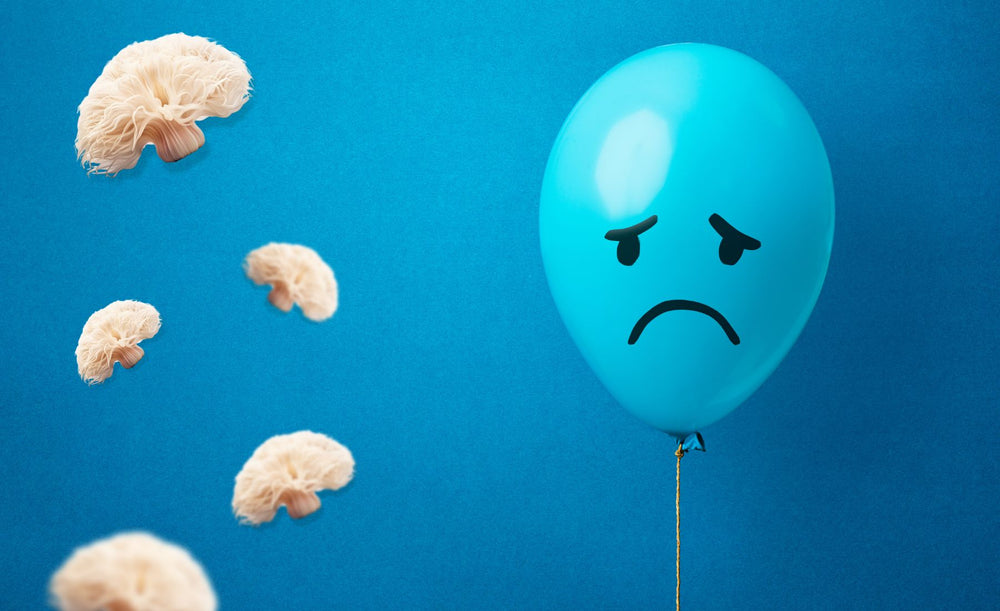Lion’s Mane: Improving Mood by Reducing Anxiety and Depression

Introduction: Lion’s Mane and Its Mood-Enhancing Properties
Lion’s Mane (Hericium erinaceus) is a unique mushroom that has been treasured in traditional Chinese medicine for centuries. With its distinctive appearance resembling a lion's mane, this potent fungus is not only sought after for its culinary delights but also for its numerous health benefits. One remarkable aspect of Lion's Mane is its ability to positively impact mood and mental well-being. In this article, we will delve into the science behind how Lion's Mane can help reduce anxiety and depression, offering a natural solution for those seeking mental equilibrium.
Research has shown that Lion's Mane contains compounds that can stimulate the growth and repair of nerve cells in the brain. These compounds, known as hericenones and erinacines, have been found to promote the production of nerve growth factor (NGF), a protein that plays a crucial role in the growth, maintenance, and survival of neurons. By enhancing NGF levels, Lion's Mane may help protect against age-related cognitive decline and support overall brain health.
Furthermore, Lion's Mane is rich in antioxidants, which are molecules that help combat oxidative stress in the body. Oxidative stress is linked to various mental health disorders, including anxiety and depression. By reducing oxidative stress, Lion's Mane may help alleviate symptoms of these conditions and promote a sense of calm and well-being. The combination of neuroregenerative properties and antioxidant effects makes Lion's Mane a promising natural remedy for enhancing mood and cognitive function.
Understanding Anxiety and Depression: The Modern Mental Health Challenges
Anxiety and depression have become prevalent challenges in today's society, affecting millions of people worldwide. The fast-paced lifestyle, constant connectivity, and increasing societal pressures have contributed to the rising incidence of these mental health conditions. Anxiety leaves individuals feeling overwhelmed and restless, while depression engulfs them in a fog of sadness and hopelessness. Conventional treatments such as therapy and medication play a vital role, but there is growing interest in alternative approaches that address the root causes of these conditions.
It is important to recognize that anxiety and depression are complex disorders influenced by a variety of factors, including genetics, brain chemistry, and life experiences. Research has shown that individuals with a family history of these conditions may be more predisposed to developing them. Additionally, imbalances in neurotransmitters such as serotonin and dopamine can contribute to the manifestation of anxiety and depression symptoms. Understanding these underlying mechanisms is crucial in developing effective treatment strategies tailored to each individual's needs.
Furthermore, the stigma surrounding mental health issues often prevents individuals from seeking help and receiving the support they need. This stigma can lead to feelings of isolation and shame, exacerbating the symptoms of anxiety and depression. By promoting open conversations and providing education about these conditions, we can work towards creating a more supportive and understanding environment for those struggling with mental health challenges.
How Lion’s Mane Affects Brain Chemistry to Improve Mood
Our brain's chemistry plays a crucial role in regulating our emotions and mood. Lion's Mane has shown promise in positively influencing brain chemistry to alleviate anxiety and depression. Studies have identified compounds within Lion's Mane called hericenones and erinacines, which have neuroprotective properties and assist in the synthesis of nerve growth factors. These factors promote the growth and development of nerve cells, aiding in the restoration of the brain's balance and functionality.
Furthermore, Lion's Mane has been found to stimulate the production of crucial neurotransmitters like serotonin and dopamine, which regulate mood, sleep, and emotional well-being. By enhancing the availability of these neurotransmitters, Lion's Mane supports a more positive outlook and a calmer state of mind.
Moreover, Lion's Mane is also rich in antioxidants, which play a key role in reducing oxidative stress in the brain. Oxidative stress is linked to various neurological disorders and can contribute to mood disturbances. By combating oxidative stress, Lion's Mane helps protect brain cells from damage and supports overall cognitive function.
Additionally, Lion's Mane contains beta-glucans, which have been shown to have anti-inflammatory properties. Inflammation in the brain can negatively impact mood and cognitive function. The anti-inflammatory effects of Lion's Mane may help reduce inflammation in the brain, creating a more conducive environment for optimal brain chemistry and emotional well-being.
The Role of Lion’s Mane in Reducing Anxiety: Scientific Insights
Scientific research has provided intriguing insights into how Lion's Mane reduces anxiety. Anxiety is closely associated with inflammation and oxidative stress in the brain. Lion's Mane possesses potent anti-inflammatory and antioxidant properties, which help protect the brain against these harmful effects. By reducing inflammation and oxidative stress, Lion's Mane creates a conducive environment for improved mental health.
Studies conducted on animals have demonstrated Lion's Mane's anxiety-reducing effects. In one study, mice administered with Lion's Mane extract exhibited decreased anxiety behaviors in a maze test, suggesting its potential as a natural anxiety-relieving agent. While more research is needed to fully understand the mechanisms behind these effects in humans, these initial findings are promising.
Furthermore, Lion's Mane is not only beneficial for reducing anxiety but also shows potential in enhancing cognitive function. Some studies suggest that Lion's Mane may promote the growth and repair of nerve cells in the brain, which could lead to improved memory, focus, and overall cognitive performance. This dual benefit of addressing anxiety and supporting cognitive health makes Lion's Mane a versatile and valuable natural supplement.
Additionally, Lion's Mane is a culinary delicacy in some parts of the world, known for its unique taste and texture. It is often used in various dishes, especially in Asian cuisine, where it is believed to not only offer great flavor but also provide health benefits. The versatility of Lion's Mane as both a culinary ingredient and a potential natural remedy further highlights its significance in traditional and modern wellness practices.
Combating Depression Naturally with Lion’s Mane
Depression can be a debilitating condition, impacting individuals physically, emotionally, and mentally. Lion's Mane offers a natural approach to combat depression and uplift mood. The lion's mane mushroom contains a variety of bioactive compounds that contribute to its antidepressant properties. These compounds, such as hericenones and erinacines, work synergistically to support brain health and enhance mood.
Furthermore, Lion's Mane promotes the growth of new neurons through a process known as neurogenesis. This remarkable ability to create new brain cells is particularly valuable in the context of depression, where brain cell regeneration is often impaired. By stimulating neurogenesis, Lion's Mane helps repair and rejuvenate the brain, fostering a more positive and resilient mental state.
It is fascinating to note that Lion's Mane has been used for centuries in traditional Chinese medicine for its cognitive benefits. Beyond its antidepressant properties, this mushroom is also known for its ability to enhance cognitive function, improve memory, and support overall brain health. The unique combination of compounds found in Lion's Mane, including beta-glucans and antioxidants, contributes to its neuroprotective effects, shielding the brain from oxidative stress and inflammation.
Moreover, Lion's Mane is not only beneficial for mental health but also for physical well-being. Studies have shown that this medicinal mushroom has anti-inflammatory and immune-boosting properties, which can help alleviate symptoms of stress and anxiety. By modulating the body's inflammatory response and enhancing immune function, Lion's Mane offers a holistic approach to combatting depression and promoting overall wellness.
Lion’s Mane and Neurogenesis: Promoting Brain Health for Better Mood
Neurogenesis, the formation of new nerve cells, is essential for maintaining optimal brain health. Lion's Mane, a unique mushroom with promising cognitive benefits, has demonstrated the remarkable ability to stimulate neurogenesis. This process of creating new neurons is crucial for enhancing brain function and overall mental well-being. By promoting neurogenesis, Lion's Mane plays a vital role in rewiring neural circuits, which can lead to improved cognitive abilities and a more positive mood.
Furthermore, the impact of Lion's Mane on neurogenesis extends beyond cognitive enhancement. Research suggests that the stimulation of new nerve cell growth by Lion's Mane may also contribute to neuroplasticity, the brain's ability to adapt and reorganize itself. This adaptability is essential for learning, memory formation, and overall mental flexibility.
Additionally, neurogenesis is closely linked to the regulation of stress hormones such as cortisol. Chronic stress can disrupt this delicate balance, leading to an overproduction of cortisol that can result in anxiety and depression. Studies have shown that Lion's Mane possesses adaptogenic properties that help modulate cortisol levels, promoting a state of relaxation and emotional stability. By supporting a healthy stress response, Lion's Mane not only benefits cognitive function but also contributes to overall mental wellness.
The Anti-Inflammatory Effects of Lion’s Mane on Mental Health
Inflammation in the brain is increasingly recognized as a contributing factor to various mental health disorders, including anxiety and depression. The anti-inflammatory properties of Lion's Mane are instrumental in alleviating these conditions. By suppressing the release of pro-inflammatory cytokines, Lion's Mane helps mitigate inflammation and reduce its damaging effects on mental well-being.
Moreover, Lion's Mane contains active compounds that can cross the blood-brain barrier, directly interacting with brain cells and exerting anti-inflammatory effects. This unique ability to target inflammation within the brain makes Lion's Mane a valuable natural remedy for individuals seeking relief from anxiety and depression.
Studies have shown that Lion's Mane not only reduces inflammation in the brain but also promotes the growth and repair of nerve cells. This neuroprotective effect is crucial in maintaining cognitive function and overall mental health. By stimulating nerve growth factor (NGF) production, Lion's Mane supports the regeneration of damaged neurons and enhances brain plasticity.
Furthermore, the antioxidant properties of Lion's Mane play a significant role in protecting the brain from oxidative stress, which is known to contribute to the development of various neurological disorders. By scavenging free radicals and reducing oxidative damage, Lion's Mane helps maintain a healthy brain environment and supports optimal mental functioning.
Lion’s Mane and Stress Reduction: Balancing Cortisol Levels
Chronic stress wreaks havoc on both the mind and body, leading to a host of health problems, including anxiety and depression. Lion's Mane offers a natural means of combating stress and reducing its adverse effects. By modulating cortisol levels, Lion's Mane helps restore balance in the body's stress response system.
Cortisol is often referred to as the "stress hormone" as it is released in response to stress. However, when cortisol levels remain elevated for extended periods, it can have detrimental effects on mental well-being. Lion's Mane assists in regulating cortisol levels, ensuring that the stress response remains within a healthy range, and minimizing the risk of anxiety and depression.
Furthermore, Lion's Mane is not only beneficial for stress reduction but also offers a range of cognitive benefits. Studies have shown that Lion's Mane contains compounds that can stimulate the growth and repair of nerve cells in the brain, potentially enhancing cognitive function and memory. This dual action of Lion's Mane on both stress reduction and cognitive enhancement makes it a valuable natural supplement for overall mental well-being.
In addition to its effects on cortisol levels and cognitive function, Lion's Mane is also rich in antioxidants, which help protect the body from oxidative stress and inflammation. These antioxidants work to combat free radicals in the body, which can contribute to aging and various chronic diseases. By incorporating Lion's Mane into your daily routine, you not only support your body's stress response and cognitive health but also boost your overall well-being through its antioxidant properties.
Incorporating Lion’s Mane into Your Routine for Anxiety and Depression Relief
Adding Lion's Mane to your daily routine may be a valuable step towards improving mood and reducing anxiety and depression. Lion's Mane is available in various forms, including capsules, powders, and extracts, making it easy to incorporate into your lifestyle. As with any supplement or natural remedy, it is important to consult with a healthcare professional before starting any new regimen.
Incorporating Lion's Mane into your routine can be as simple as adding it to your meals or beverages. For instance, you can enjoy a Lion's Mane-infused tea or blend Lion's Mane powder into your smoothies. However, it is essential to ensure you are using high-quality, reputable sources of Lion's Mane to maximize its benefits.
Lion's Mane, scientifically known as Hericium erinaceus, is a type of medicinal mushroom that has been used for centuries in traditional Chinese medicine for its potential health benefits. This unique mushroom is named for its cascading, mane-like appearance and is revered for its potential cognitive and mood-enhancing properties.
Research suggests that Lion's Mane may support brain health by promoting the growth and repair of nerve cells. It contains compounds that can stimulate the production of nerve growth factor (NGF), a protein that plays a crucial role in the growth, maintenance, and survival of nerve cells. By supporting neuroplasticity, Lion's Mane may help improve cognitive function, memory, and mood.
Conclusion: The Holistic Benefits of Lion’s Mane for Mental Wellbeing
Lion's Mane offers a holistic approach to improving mood and reducing anxiety and depression. Its unique properties, ranging from its ability to stimulate neurogenesis to its anti-inflammatory effects, make it a promising natural remedy for mental well-being. While Lion's Mane can be a valuable addition to any wellness routine, it is important to remember that mental health conditions are complex and multifaceted. Seeking professional guidance and using a comprehensive approach that incorporates various strategies is crucial for achieving long-lasting improvements in mental well-being.





